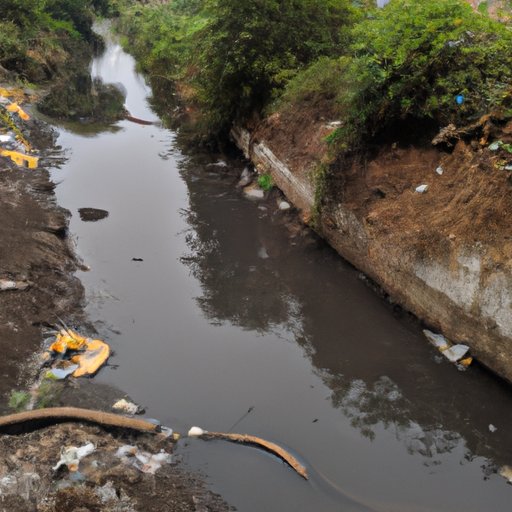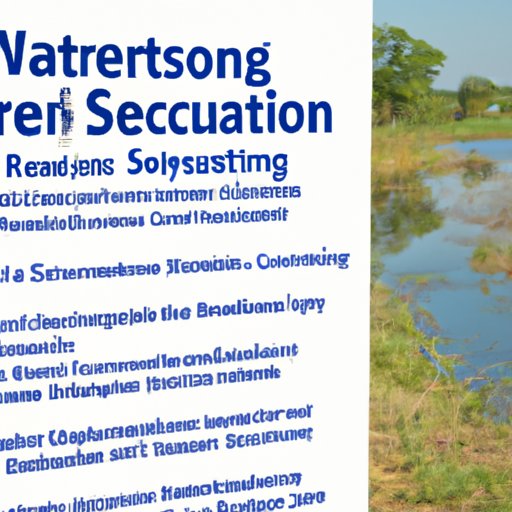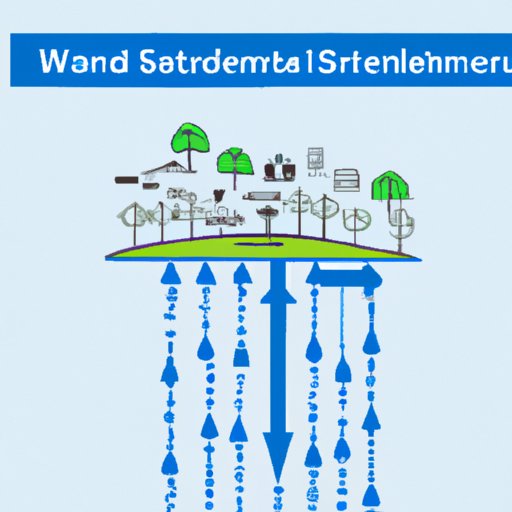Introduction
Watershed science is a field of study that examines the hydrological characteristics of watersheds, which are land areas that drain into a common body of water such as a lake, river, or ocean. This science focuses on understanding how various aspects of the watershed interact with each other, such as precipitation, runoff, soil erosion, and surface water flow. The aim of watershed science is to identify and assess potential threats to the health of watersheds and to develop strategies for protecting them.
The Fundamentals of Watershed Science
In order to understand the fundamentals of watershed science, it is important to first define what a watershed is. A watershed is a geographic region that drains into a common body of water. It can be as small as a stream or as large as an entire river basin. The boundaries of a watershed are determined by the topography of the land, which determines how water flows across the landscape. Watersheds come in many different shapes and sizes, but they all have one thing in common—they all contain water.
Once the boundaries of a watershed have been determined, it is then necessary to understand the hydrological processes that are at work within it. These processes include precipitation, runoff, infiltration, evaporation, and surface water flow. Each process plays an important role in maintaining the health of the watershed and its water resources. For example, precipitation replenishes the water supply, while runoff carries pollutants away from the watershed.
There are two main types of water resources found in watersheds: surface water and groundwater. Surface water is found in streams, rivers, lakes, and wetlands, while groundwater is found beneath the surface of the earth. Both types of water resources are essential for the health of a watershed and must be managed responsibly.

Impact of Watershed Science on Our Environment
Watershed science is important because it helps us to understand how different components of the watershed interact with each other. This knowledge can be used to identify potential threats to the health of a watershed and to develop strategies for protecting it. For example, understanding the connectivity between different parts of a watershed can help scientists identify areas where pollution is entering the water system and take steps to reduce it.
In addition, watershed science can also help us to understand the effects of human activity on watersheds. As humans continue to modify the landscape through activities such as urbanization, agricultural production, and industrial development, there can be significant impacts on the health of watersheds. Understanding these impacts can help us to create policies that protect and preserve our water resources.
Stakeholders in Watershed Science
Watershed science involves a wide range of stakeholders, including federal and state agencies, local governments, non-governmental organizations, and private citizens. Each group has its own set of interests and goals when it comes to managing watersheds, but they all share the common goal of protecting and preserving our water resources. Federal and state agencies are responsible for setting regulations and enforcing laws designed to protect watersheds, while local governments and non-governmental organizations focus on developing strategies for improving water quality and reducing pollution.
Private citizens also play an important role in watershed science. They can help by volunteering their time to monitor water quality, participating in citizen science projects, and advocating for the protection of watersheds. By working together, all of these stakeholders can help ensure that our water resources remain healthy and abundant.

Benefits of Watershed Science for Local Communities
Watershed science can have a positive impact on local communities by improving water quality, increasing economic opportunities, and enhancing environmental stewardship. Improved water quality can lead to better public health, as access to clean drinking water is essential for human survival. In addition, improved water quality can also benefit businesses that rely on water resources, such as farmers and fishermen.
Increased economic opportunities can result from watershed science as well. For example, conservation efforts in a watershed can attract ecotourism, which can provide jobs and income for local residents. Additionally, watershed science can help to identify potential sources of renewable energy, such as hydroelectric power, which can bring economic benefits to a community.
Finally, watershed science can help to promote environmental stewardship. By understanding the importance of protecting our water resources, we can work together to conserve and protect them for future generations. Through education and outreach, watershed science can help to foster a culture of respect for the environment and encourage people to take action to protect our water resources.
Conclusion
Watershed science is an important field of study that helps us to understand the hydrological processes at work in a watershed and the impact of human activity on our water resources. By working together, stakeholders in watershed science can help to protect our water resources, improve water quality, and increase economic opportunities for local communities. Through education and outreach, watershed science can also help to promote environmental stewardship and foster a culture of respect for the environment.
In conclusion, watershed science is an essential tool for protecting and preserving our water resources and improving the quality of life for local communities. By understanding the fundamentals of watershed science, we can work together to ensure that our water resources remain healthy and abundant for generations to come.
(Note: Is this article not meeting your expectations? Do you have knowledge or insights to share? Unlock new opportunities and expand your reach by joining our authors team. Click Registration to join us and share your expertise with our readers.)
